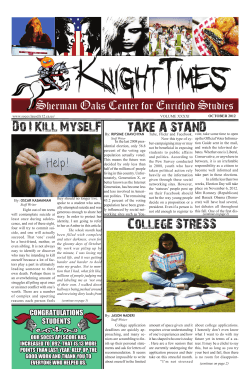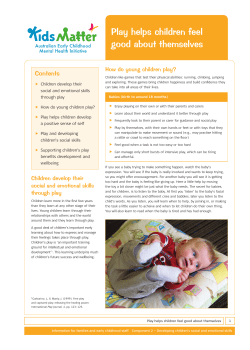
GCSE English Reading Non-fiction Travel and Adventure
GCSE English Reading Non-fiction Travel and Adventure Reading ‘between the lines’ GCSE English Reading Non-fiction Lessons 1&2 LO: Can I explore how writers convey thoughts, feelings and ideas in descriptive writing? Key words: Infer, Description, Tone, Mood The children’s writer C.S. Lewis once gave this advice to a child who had written him a letter about becoming a writer… “ In writing, don’t use adjectives which merely tell us how you want us to feel about the thing you are describing. I mean, instead of telling us a thing was “terrible,” describe it so that we'll be terrified. Don't say it was “delightful”; make us say “delightful” when we've read the description. You see, all those words (horrifying, wonderful, hideous, exquisite) are only like saying to your readers, “Please will you do my job for me.” What does Lewis mean? Is this good advice? ” Which are commonly found in descriptive writing? • 1st, 2nd or 3rd person (narrative viewpoint) • Directly addressing the reader • Imperatives (commands) • Rhetorical questions • Register - formal/informal language • Diction - simple/complex vocabulary • Figurative language & imagery: similes/metaphor/ personification etc. • Word play & puns • Alliteration • • • • • • • • • • • • • • Rhyme & rhythm Anecdote & allusion Slogan & catchphrase Statistics & facts Exaggeration & hyperbole Repetition Humour Sensory language Emotive language Punctuation type Expert advice Short sentences Superlatives Lists 1. The Grand Canyon 1.You felt excited when approaching the place 2.You were amazed – you hadn’t expected it to be so huge 3.You felt overwhelmed (i.e. the experience had a strong emotional effect) IN GROUPS 1. The Grand Canyon 2. Favelas, Brazil 1.You felt shocked on seeing the favelas for the first time 2.You felt sympathy for young children living in poor conditions 3.You felt inspired by the children’s cheerfulness and resilience IN GROUPS 2. Favelas, Brazil 3. London’s backstreets 1.You realised you had become lost 2.You felt panicked and scared 3.You felt trapped IN GROUPS 3. London’s backstreets 4. Bora Bora Island 1.You were impressed by the island’s beauty 2.You felt calm, happy and relaxed 3.You got bored after a while – it was too quiet IN GROUPS 4. Bora Bora Island 5. New York City 1.You felt disbelief at the size of the many skyscrapers 2.You thought the food was incredible 3.You thought the fashion in the city was the best thing about it IN GROUPS 5. New York City 6. Tuscany, Italy 1.You were interested in the history of this place 2.You thought the weather was great 3.You felt embarrassed – you couldn’t communicate with anyone IN GROUPS 6. Tuscany, Italy Text 1: From The Telegraph’s Just Back: Memories of Auschwitz GCSE English Reading Non-fiction Lessons 3&4 LO: Can I read for inference and write a detailed response to a nonfiction text? Key words: Infer, Description, Tone, Mood GCSE English Language exam, you are expected to both read and write In the different kinds of non-fiction. This unit focuses on the reading section of the paper, which asks you to read and respond to texts in certain ways. You are asked… retrieve explain 1. To information and it to show you’ve fully understood a text (usually a newspaper article) analyse a text’s presentational features, such as headlines and images, and link them to 2. To the text (again – usually a newspaper article) infer 3. To meanings, ideas, thoughts, feelings etc. from a text – to ‘read between the lines’ (usually a descriptive piece) compare the use of language in two non- 4. To fiction texts. IN PAIRS Describe some of the thoughts and feelings experienced by Kate Giles during her visit to a former concentration camp. In Text 3, Kate Giles describes to readers her visit to Auschwitz, a former concentration camp. She expresses various thoughts and feelings during this overwhelming and life-changing visit. At the beginning of the extract, the narrator expresses some uncertainty about the visit. Although her mother has told her that everyone should visit this place at one time in their life, Kate says, “I didn’t know what she meant”. This implies that she is confused about her mother’s claim; perhaps she is not prepared for the moving experience she is about to face. On entering Auschwitz, the place clearly immediately has an effect on Kate. As she visits innocent looking buildings, she is faced with “exhibits and photos detailing the atrocities” that happened where she stands. This clearly has an impact on Kate; she walks around “slowly and quietly, talking only in hushed whispers” which suggests that she is probably thinking about the terrible history of the buildings. We know she is reflecting on the awful things that happened as she says being silent “feels like the right thing to do”. Activity: Complete this answer. It needs another 2-3 short paragraphs… IN GROUPS Text 2: An extract from A Cook's Tour by Anthony Bourdain Text 3: An Extract from Black Earth City by Charlotte Hobson Text 4: From The Telegraph’s Just Back: A gruelling trek in Nepal 1. •Highlight the key words in the question. Usually, the question asks you to explain some thoughts and feelings of a first-person narrator. •Be aware, however, that you may be asked to infer and deduce in a different way. PAY CAREFUL ATTENTION TO THE QUESTION. Describe some of the thoughts and feelings experienced by Anthony Bourdain as he witnesses the slaughter of a pig. Explain some of the thoughts and feelings experienced by the narrator of Black Heart City. Explain some of the thoughts and feelings experienced by Denis Spencer during his gruelling trek in Nepal. 2. Ferry Across the Lake: Explain some of the thoughts and feelings Christopher Ondaatje has about his experience of Lake Victoria. •Actively read the text: You are looking for particular parts of the text which you’ve been asked to write about in the question. •Next, go through the text, highlighting you answer the question. sections that will help annotate the article very briefly with ideas that will •You might like to help you answer the question. 2. Jigsaw Activity The opening sentences convey the narrator’s guilt. The repetition of ‘I’ll always remember’ emphasises the significance of the event. The vivid sensory descriptions of decay and neglect imply the writer felt disgust. The mood of the narrator changes drastically. 3. Connective Firstly Secondly Thirdly As well as this Furthermore Moreover Finally Lastly Likewise Similarly The author / language in the text… Builds Connotes Contrasts Conveys Creates Demonstrates Describes Depicts Emphasises Evokes Exaggerates Expresses Gives the impression Gives a sense Highlights Informs Implies Indicates Narrates Realises Recognises Refers to Reflects Reveals Signifies Suggests Shows Tells The reader… (or ‘we’…) Is made aware Is informed Is told Learns Discovers Realises USEFUL WORDS & PHRASES Explain which parts of Bill Bryson’s A Walk in the Woods you find tense and exciting. IN GROUPS
© Copyright 2025





















